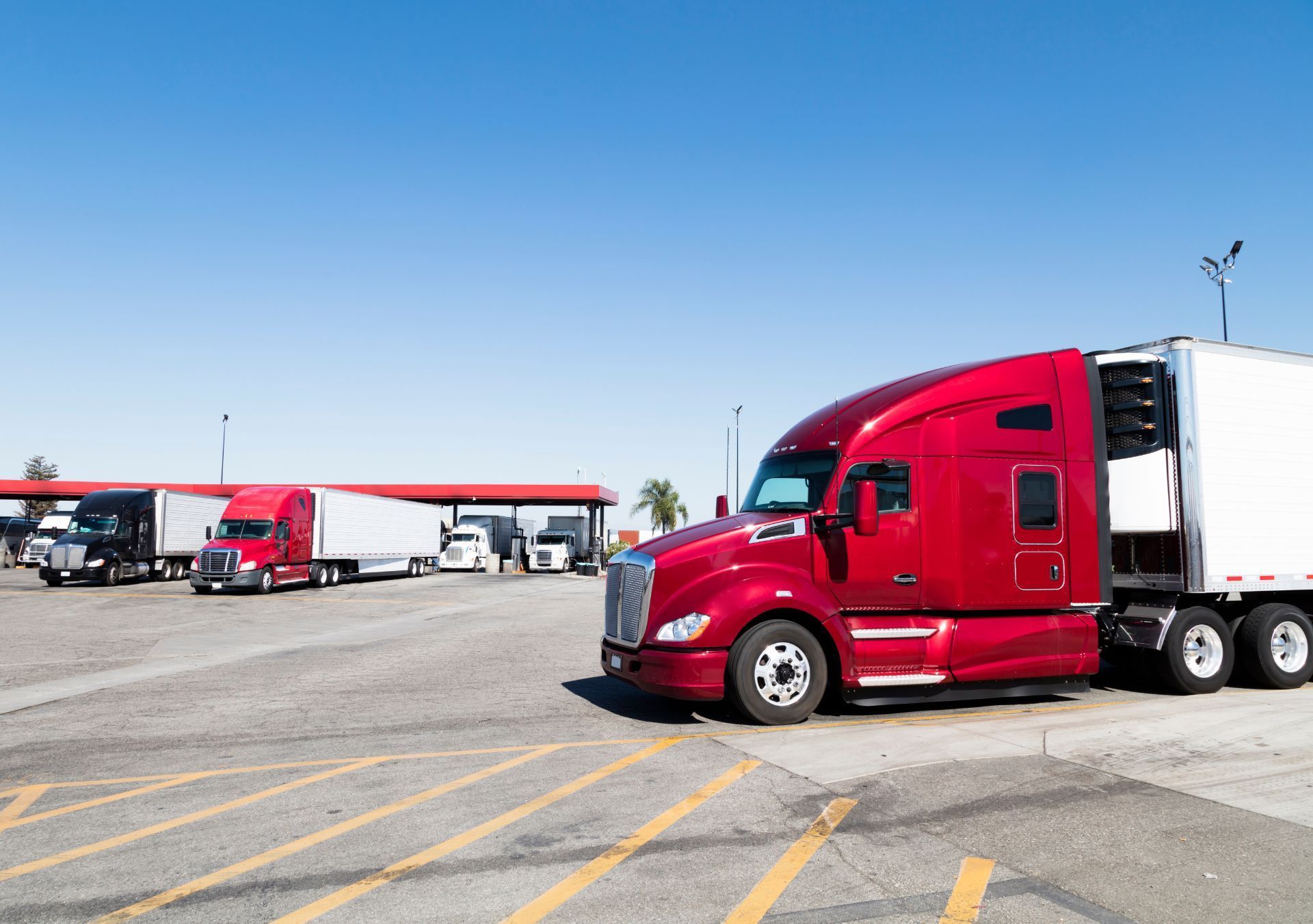
Most Common Business Policies
Index
Contact Us
Understanding the Basics of Trucking Insurance
Trucking insurance is a specialized form of insurance designed to protect vehicles that carry cargo for commercial purposes. Unlike personal auto insurance, trucking insurance acknowledges the unique risks and responsibilities that come with operating large commercial vehicles. Understanding this type of insurance is crucial for fleet owners and independent truckers alike.
What is Trucking Insurance?
Trucking insurance covers a variety of risks associated with the transportation of goods. This policy not only protects the truck itself but also provides liability coverage for accidents, damage to third-party property, and cargo loss. Additionally, trucking insurance can include policies like trailer interchange coverage and non-trucking liability, depending on the needs of the business.
The main components of trucking insurance include liability coverage, physical damage coverage, and cargo insurance. Each of these elements plays a vital role in ensuring that operators are financially protected against potential losses or damages incurred during transport. For instance, physical damage coverage protects against damages to the truck itself due to accidents, theft, or vandalism, while cargo insurance specifically covers the goods being transported, offering peace of mind to both the driver and the shipper.
Why is Trucking Insurance Important?
Having trucking insurance is not just a legal requirement in New York; it also serves as a safety net for businesses engaged in freight transport. In the event of an accident, liability coverage can prevent overwhelming financial burdens that may arise from unforeseen expenses. Without sufficient insurance, a truck driver could face lawsuits, lost income, and hefty repair bills that could jeopardize their financial viability.
Furthermore, trucking insurance builds trust with clients who want assurance that their goods will be transported safely. It can also enhance business credibility, making companies more appealing to potential business partners. In an industry where delays and damages can lead to significant financial losses, having comprehensive insurance coverage can differentiate a business from its competitors. Moreover, many shippers now require proof of insurance before entering into contracts, making it essential for truckers to have adequate coverage to secure lucrative freight contracts.
Additionally, the trucking industry is subject to various regulations and compliance standards, which can vary by state and federal guidelines. Insurance not only helps in meeting these legal requirements but also provides a framework for risk management. By investing in the right insurance policies, trucking companies can better navigate the complexities of the industry, ensuring that they are prepared for any eventualities that may arise on the road.

The Specifics of New York Trucking Insurance
New York has specific regulations when it comes to trucking insurance, reflecting both the state's risk landscape and its commitment to ensuring road safety. It is essential for truck operators in New York to understand these regulations and the types of coverage that best meet their needs.
State Requirements for Trucking Insurance in New York
In New York, commercial truck operators must carry a minimum level of insurance coverage as dictated by the state. This includes a minimum liability coverage of $750,000, but for certain types of cargo, such as hazardous materials, the required minimum can increase significantly. This is particularly important for operators dealing with flammable or toxic substances, as the potential for accidents is higher, and the resulting damages can be catastrophic.
Additionally, truckers must ensure that they comply with federal regulations from the Federal Motor Carrier Safety Administration (FMCSA), which mandates similar or even higher levels of coverage depending on the type of goods carried across state lines. The interplay between state and federal regulations can be complex, and operators should stay informed about any changes to ensure compliance and avoid hefty fines or penalties.
Common Types of Coverage in New York
Several types of coverage are vital for trucking companies operating in New York. These typically include:
- Liability Coverage: Protects against claims resulting from injuries or damages caused to other drivers and their properties.
- Cargo Insurance: Covers loss or damage of goods being transported.
- Physical Damage Coverage: Offers protection against damages to the truck itself.
- Bobtail Insurance: Provides coverage when the truck is being driven without a trailer.
Understanding these coverage types helps truck operators choose the right policy tailored to their specific needs and operational circumstances. Furthermore, it is crucial to consider additional endorsements that can enhance coverage, such as uninsured motorist coverage, which protects against accidents involving drivers who lack adequate insurance. Additionally, many trucking companies opt for comprehensive and collision coverage to safeguard against a wider range of incidents, including theft and vandalism, which can be particularly prevalent in urban areas like New York City.
Moreover, the unique challenges posed by New York's diverse landscape—from busy city streets to rural highways—make it imperative for trucking operators to assess their risk exposure thoroughly. Factors such as weather conditions, traffic patterns, and the nature of the cargo can all influence the type of insurance coverage needed. By conducting a comprehensive risk assessment, truck operators can better protect their assets and ensure the safety of their drivers and the general public.
Choosing the Right Trucking Insurance Policy
Selecting the right trucking insurance policy requires careful consideration of various factors. A well-chosen policy can save money and provide necessary protections tailored to the nature of the trucking business.
Factors to Consider When Selecting a Policy
When choosing a trucking insurance policy in New York, consider the following factors:
- Type of Cargo: The kind of goods being transported can influence insurance premiums significantly. Hazardous materials often require special coverage.
- Driving History: A driver's record of safety can impact insurance rates. A clean driving record generally results in lower premiums.
- Business Size: Larger fleets may benefit from different coverage options compared to independent owner-operators.
Evaluating these components can provide a clearer perspective on what the trucking operation truly needs, making the insurance selection process more effective. Additionally, understanding the specific risks associated with your cargo type can help in negotiating better terms with insurers. For instance, transporting perishable goods may necessitate coverage for spoilage, while high-value items might require extra protection against theft or damage during transit. This nuanced approach not only aids in selecting the right policy but also fosters a more informed dialogue with insurance providers.
Tips for Comparing Insurance Quotes
When evaluating quotes from different insurance providers, consider the following tips to ensure a comprehensive analysis:
- Compare Like for Like: Ensure that all quotes are for the same types of coverage to make a fair comparison.
- Investigate Reputable Insurers: Research each insurer's reputation and customer service history before making a decision.
- Look for Bundling Discounts: Some companies may offer discounts if you bundle multiple policies under one provider.
Taking the time to carefully evaluate quotes can lead to significant savings while still providing the essential coverage needed to operate a trucking business. Furthermore, don't overlook the importance of understanding the policy's fine print. Terms and conditions can vary widely between providers, and knowing the specifics—such as deductibles, exclusions, and limits—can prevent unexpected costs down the line. Engaging with an insurance broker who specializes in trucking can also be beneficial, as they can offer insights into the market and help identify policies that align closely with your operational needs and budget constraints.
The Cost of Trucking Insurance in New York
The cost of trucking insurance can vary greatly based on a multitude of factors. Understanding what influences these costs can help businesses budget accordingly and make informed decisions when it comes to their insurance policies.
Factors Influencing the Cost of Insurance
Several variables contribute to the overall cost of trucking insurance, including:
- Type of Cargo: Higher risk cargo increases premiums.
- Driving Experience: New drivers may face higher costs than experienced ones.
- Vehicle Type and Age: The kind of trucks and their age can affect insurance rates significantly.
Understanding these factors can help business owners anticipate potential costs, leading to better financial planning and management. Additionally, the geographical area where the trucking company operates plays a crucial role in determining insurance costs. For instance, urban areas with higher traffic congestion and accident rates may lead to increased premiums compared to rural locations. Moreover, the frequency of theft or vandalism in certain regions can also influence the overall risk assessment by insurers, further affecting pricing.
Ways to Lower Your Trucking Insurance Premiums
There are numerous strategies that trucking companies can employ to lower their insurance premiums:
- Maintain a Clean Driving Record: Safe driving leads to lower insurance costs over time.
- Enroll in Safety Programs: Many insurers offer discounts for completing training or safety programs.
- Increase Deductibles: Opting for higher deductibles can lower premium costs, but it also means taking on more risk in the event of a claim.
Implementing these strategies can result in significant savings, allowing more resources to be allocated elsewhere in the business. Furthermore, utilizing telematics technology can provide real-time data on driving behaviors, enabling companies to monitor and improve their safety practices. This proactive approach not only enhances safety but can also lead to additional discounts from insurers, as they recognize the reduced risk associated with well-monitored fleets. Additionally, regularly reviewing and comparing insurance policies can uncover better rates or coverage options, ensuring that businesses are not overpaying for their insurance needs.
Filing a Trucking Insurance Claim in New York
The process of filing a claim can sometimes be daunting for truck operators. Understanding the steps involved can streamline the process and provide clarity in moments of stress.
Steps to Filing a Claim
If you find yourself needing to file an insurance claim, follow these steps:
- Contact Your Insurer: Notify your insurance company as soon as possible after the incident.
- Document the Incident: Gather necessary evidence, such as photographs and witness accounts.
- Complete Claim Forms: Fill out the required claim forms, providing all relevant details.
By adhering to these steps, you can ensure that your claim is processed efficiently and minimize potential delays.
What to Expect After Filing a Claim
Once you've filed a claim, be prepared for potential follow-ups from your insurance provider. They may request additional information or documentation. The timeframe for resolution can vary based on the complexity of the claim.
Typically, you will receive updates from your insurer regarding the status of your claim, and they may provide a decision on coverage based on the evidence submitted. Understanding this process can prepare you for what lies ahead, reducing anxiety during stressful situations.
It's also important to stay organized during this period. Keeping a dedicated file for all correspondence, claim forms, and supporting documents can help you track the progress of your claim. This organization can prove invaluable if any disputes arise or if you need to reference specific details later on. Additionally, maintaining open lines of communication with your insurer can foster a better relationship and expedite the process, as they will appreciate your proactive approach.
Moreover, be aware of the potential impact of your claim on future premiums. Depending on the outcome, your insurer may reassess your risk profile, which could lead to changes in your policy costs. Staying informed about how claims are evaluated can empower you to make better decisions in the future, whether that means considering different coverage options or implementing safety measures to prevent incidents from occurring again.

Frequently Asked Questions About New York Trucking Insurance
As trucking insurance involves various complexities, there are several common questions that arise among truck operators in New York.
Do I Need Special Coverage for Hazardous Materials?
Yes, if you are transporting hazardous materials, you will need specialized insurance coverage. New York requires higher liability limits for trucks carrying these types of cargo, as the risks involved can lead to severe consequences. Additionally, the Federal Motor Carrier Safety Administration (FMCSA) mandates that carriers transporting hazardous materials comply with specific regulations, which can include obtaining a Hazardous Materials Endorsement on their commercial driver’s license (CDL). This endorsement not only ensures that drivers are trained to handle such materials safely but also reinforces the importance of having the right insurance to cover potential incidents.
What Happens if I Don’t Have Trucking Insurance in New York?
Operating without insurance in New York can lead to severe penalties, including fines, suspension of your vehicle registration, and potential legal action in the event of an accident. More importantly, it leaves truck operators financially exposed in the event of an accident or liability claim. In New York, the minimum liability coverage required is $750,000 for general freight, but this amount can increase significantly depending on the type of cargo being transported. Without adequate coverage, you not only risk losing your vehicle but also face the possibility of personal bankruptcy if you are held responsible for damages or injuries resulting from an accident.
Having appropriate trucking insurance is paramount to operating legally and safely in New York. Without it, not only is your business at risk, but so too are your financial assets and livelihood. Furthermore, the trucking industry is heavily regulated, and compliance with insurance requirements is a critical aspect of maintaining your operating authority. Regular audits and inspections by regulatory bodies can reveal lapses in coverage, leading to additional fines and operational disruptions. In such a competitive market, ensuring that you have the right insurance not only protects you but also enhances your credibility with clients and partners, fostering trust and reliability in your business dealings.
